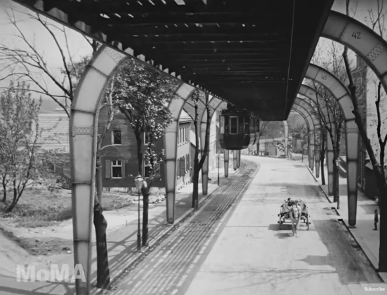“The Flying Train” was by far the video that fascinated me the most. The technical wonder of having a suspend rail going through town before automobiles were vastly available feels like something out of a movie about a futuristic world, like “Metropolis” or “Dark City.” Also, as Edison had 35 mm film patented, Willian Kennedy Dickson left the Edison company and started Mutoscope, which became the biography company had the come up with a new format, so he invented the 70 mm film. This spectacular format captured a vast amount of detail, and it was shot at 30 fps which gave a much more natural motion than Edison’s 35mm. The movement motion is so smooth and natural that I had to research how they did it; after learning that it was not done by interpolation, but it was shot like that, I was genuinely amazed.

“The Flying Train” takes us on a suspended ride in 1902 Germany, which its original footage, of the early days of cinema, yet feeling as natural as any contemporaneous film feels. It is believed that the 68 mm nitrate film found has initially been a 70mm film that shrunk with time. The footage and ride are utterly unique. I also found some other movies and more information, which I added the links below. The film is about 3 minutes long, but it mesmerized you into watching it loop over and over. German citizens go on their daily lives below the suspended train, unaware that they were being filmed. The town of Wuppertal in Germany still had a very rural feel. The ultra-modern train for the era travels through, giving us a foretaste of how Germany was 120 years ago in great detail and realistic motion without any interpolation to make the material have a natural movement.
“The Flying Train” is one of the documentaries with camera movement. Together with the rest of Dave Kehr’s “First Films” series, it is part of an impressive part of history, cinema history, technical developments in arts and transportation, and the everyday life in an era we often only see recreated in modern film or interpolated film. “The Flying Train” is a simple yet honest and beautiful film, which show us how in many ways, the industries have not evolved as it could due to their financial goals.
As an avid film shooter, who often promotes the importance of keeping shooting in the film as the cost responsibility forces everyone to refine their craft and ensure that they are doing the best they can. “The Flying Train” further reminds me of how if companies had not been so profit-driven mainly by cost, we would be much more advanced than we already are. Especially when anyone can pick a digital camera, call themselves an expert filmmaker even when depriving minimal creative and cost responsibly.